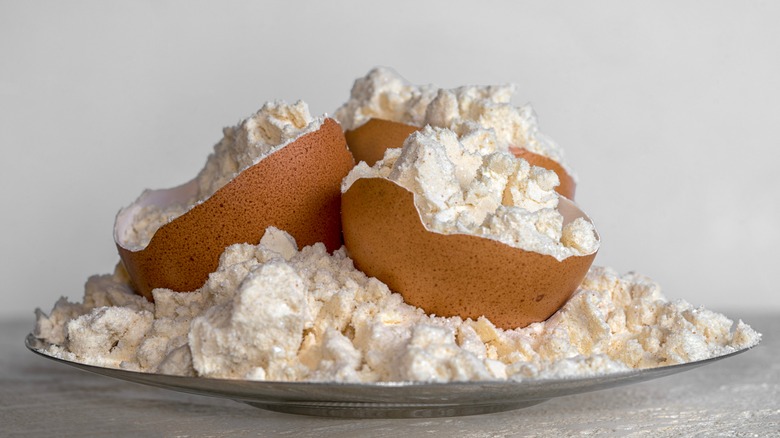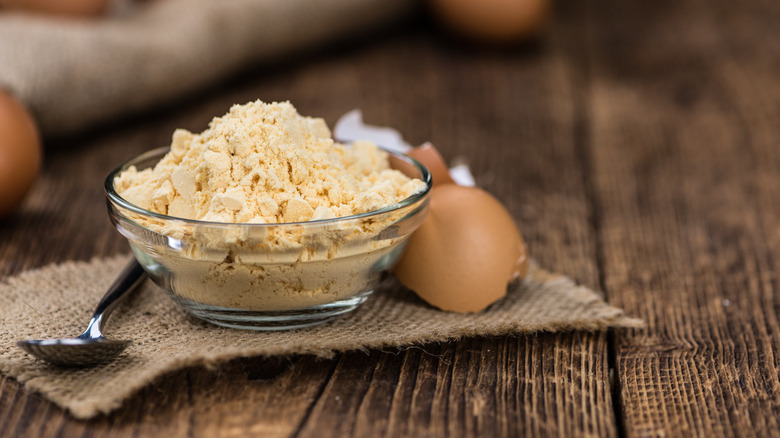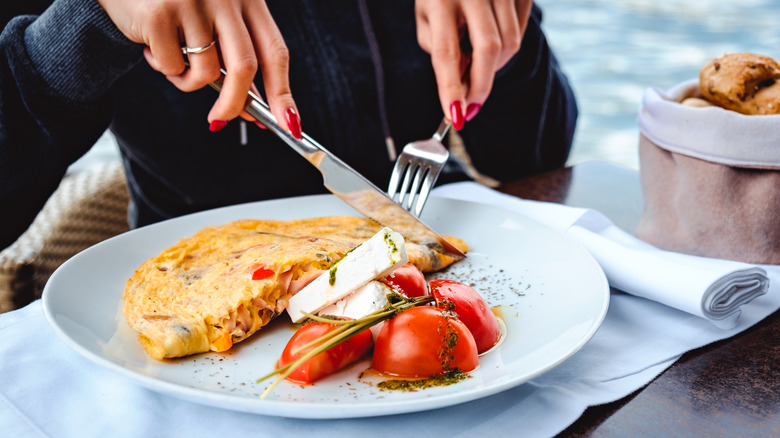What Can You Do With Dehydrated Eggs?
Rich in protein and minerals, eggs can be a nutritious addition to most diets. You can boil or fry them, use them in cooked meals, or bake them to make a perfect frittata or quiche. The only downside is their short shelf-life, which ranges between three and five weeks (when refrigerated). So, if you're getting eggs from your own chickens or buying them in bulk, you must use them relatively quickly. One solution is to dehydrate the eggs at home.
Not only does this processing method extend their shelf-life, but it also preserves their nutritional value. Plus, it frees up refrigerator space and can help you reduce food waste. For reference, powdered eggs can last up to 25 years, depending on storage conditions. As far as their nutritional value goes, they provide around 168 calories, 13.6 grams of protein, and 12.4 grams of fat per ounce. You'll also get large amounts of choline, vitamin B12, vitamin D, manganese, iron, and phosphorus.
Dehydrated eggs can be used in most recipes that would otherwise call for fresh eggs. They're ideal for omelets, frittatas, sauces, baked goods, and everything in between. All you need to do is mix them with other dry ingredients or reconstitute them before cooking.
The easy way to dehydrate eggs at home
Dehydrating eggs at home couldn't be easier. First, crack them into a mixing bowl and whisk them thoroughly. Meanwhile, line the dehydrator trays with parchment paper or grease them with oil. Next, you can either pour the beaten eggs into the trays or scramble them until soft before transferring them to the dehydrator. The latter option ensures there are no bacteria left in the eggs. (Food dehydrators kill some but not all bacteria and other pathogens, so you may want to cook your eggs beforehand.) However, some people prefer to skip this step.
Break the scrambled eggs into small pieces and dehydrate them at 165 degrees Fahrenheit for up to 12 hours. This process will take around 10 hours for raw eggs. The actual drying time may vary depending on the dehydrator model, the number of eggs, how thick the mixture is, and other factors. Another option is to beat the raw eggs until frothy, pour them into a non-stick tray, and bake them in the oven at 115 degrees Fahrenheit or higher for six to 12 hours.
No matter what method you use, check the eggs every few hours to prevent them from burning. Once fully dried, they should be crispy and crumble into powder easily. When you're done, transfer the egg powder to an airtight container or a sealed bag and freeze it. To extend its shelf-life, store it in vacuum bags in a cool, dark place.
How to use powdered eggs in your recipes
Depending on the recipe, egg powder can be used as is or rehydrated to obtain a similar texture to that of fresh eggs. If you prefer the second option, mix equal amounts of egg powder and water in a small bowl. Allow the mixture to rest for 10 to 15 minutes, and then use it in cooked meals. To reconstitute 1 egg, combine 2 tablespoons of water and 2 tablespoons of egg powder.
There are more than 100 ways to cook an egg, and most recipes can be adapted to include powdered eggs. For example, you can rehydrate the eggs and scramble them in a pan. They'll also taste great in pasta dishes, casseroles, soups, pies, and fried rice. Let's say you want to make egg waffles for breakfast. The recipe calls for 2 whole eggs, but you may use 4 tablespoons of egg powder mixed with 4 tablespoons of water.
Generally, it's okay to use powdered eggs without rehydrating them when making cakes, muffins, or other baked goods. The key is to stir the mixture thoroughly so you don't end up with clumps of powder in the batter. Apart from that, it's best to rehydrate the eggs before using them in cooked meals, sauces, or salad dressings. You can also mix dehydrated eggs into smoothies or green juices for a protein boost.


